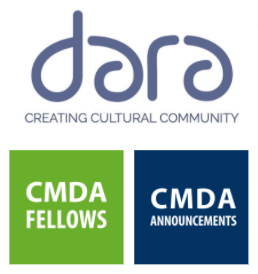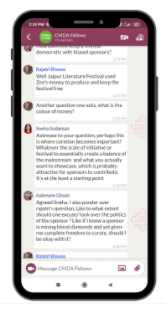Cultural Management in the Digital Age - 15 Nov - 15 Dec, 2020
- The Art X Company

- Dec 22, 2020
- 3 min read
Updated: Apr 16, 2021
“Cultural Management in the Digital Age” is a two-year project (2020-21) initiated by Goethe-Institut / Max Mueller Bhavan Mumbai in association with its head office in Munich. It also includes contributions from Goethe-Instituts Minsk and Shanghai.The first phase of the project that ran from July-August 2020 included two closed door sessions and two public sessions on online cultural production and the potential of digital delivery in the arts.
The second phase of the project included a set of workshops between November and December 2020. Led by experts from the digital humanities, culture management and digital arts domains, this four-week programme included eight closed door sessions that tackle topics in the realm of digital cultural management including digital transformation, audience development, technology and art, and building value in cultural businesses, amongst several others.
Facilitators:
Cohort: An open call was put out inviting arts and cultural professionals to apply for the programme. 40 fellows were selected based on the strength of their application to form the cohort for the programme. The enrollment process:

Programme Schedule:

Session I: Cutting Through The Noise In this session, we identified the ways in which we translate our work into digital practices. The session offered some conceptual frameworks, identified challenges, and positioned some approaches to resolving the tensions that emerge when thinking through the ideas of authorship, authority, and authenticity in our encounters with digital technologies, frameworks, and platforms.

Session II: Talking Through the Interface This session introduced methods and approaches through which we can explore the idea of the interface, and how to imagine the space of the screen and beyond. Through speculative exercises and critical prototyping, this session provided guidance as to how to think through these ideas, and open up creative possibilities for working with the digital medium.

Session III, IV & V: Building Value in Creative & Cultural Businesses These sessions were designed to help entrepreneurs craft a proposition that
maximises the value for the patrons, customers, brand and self over
short and long terms. The sessions also brought understanding on how to
build and manage total customer experience in creative & cultural ventures.

Session VI: Creating Culture in a Digital Era
How do we create in the digital space? How do we plan for it? What are the tools, protocols and mindset that best suit the needs of the hour? Instigated by a series of short impulse talks, this session aided dialogue on some of the core challenges and learnings from lived experiences of transitioning to and working in the digital space.

Session VII: Audience Building v/s Nurturing Community This session explored existing approaches to audience development, introduced the peculiarities of digital audiences and identified the location and segments of these audiences. By exploring aspects of audience accessibility online, and data touchpoints for understanding audiences, the session used case studies and discussion to provide pathways to critically view the audience as a market, big data as numbers, and community as an organism.

Session VIII: Closing Session
This session was a reflection session for the programme. We discussed:
3 things that we learned from this experience,
2 things we want to know more about, and
1 thing we need to talk more about.
The session also included a gratitude exercise.

Community Engagement:
To ensure discussion outside the classroom as well, the fellows were added on Dara. Dara is a platform designed for and by cultural practitioners and organisations to grow their communities while sharing with every person the value of a global professional network.
The project aims to build on existing work done by Goethe-Institut on trainings for cultural managers and develop cultural management expertise. It will involve setting up a curriculum for a summer school with focus on Cultural Management in the Digital Age. Based on the findings of the summer school, a relevant publication will be produced as part of a book sprint and made available as an Open Educational Resource (OER).















Comments